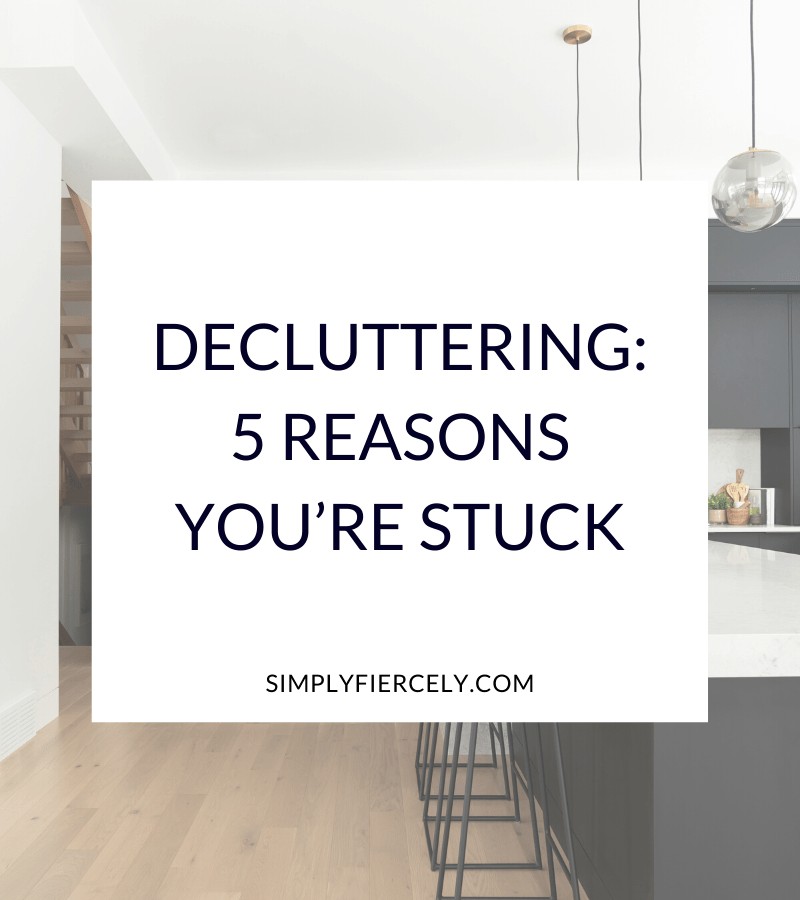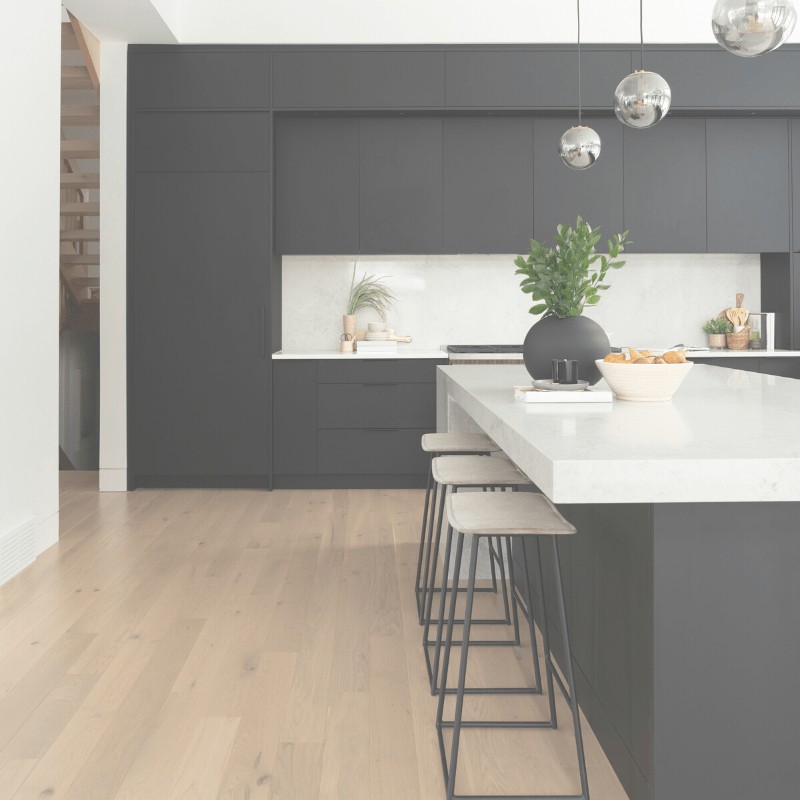Have you ever wondered why decluttering is so hard? You might be sabotaging your efforts without realising it—my friend Jen explains what to look out for!
You’ve discovered minimalism and you’re hooked.
You want to create space in your home, to live with less stuff and more intention. So naturally, you seek out the best decluttering tips and how-to’s for support.
Most of us begin by looking to the external when purging and sorting our clutter. We want the checklist or “hack” that will make it go smoothly.
Eventually, you may find yourself stuck while you declutter. Suddenly the checklists and advice aren’t helping—but they should be, right?
After all, decluttering should be as simple as physically removing items from your home.
Well, that’s not the whole picture.
How you treat yourself while you declutter is just as important as how you treat your stuff.
Removing the excess possessions from your life feels amazing. But, if you aren’t kind to yourself in the process, you may get stuck.
Today I’m sharing 5 sneaky ways you may be sabotaging your decluttering success. Plus you’ll learn how to be kinder to yourself to see even better results. After reading this article you’ll be ready to face the internal battles that may arise as you keep digging through your stuff.

Why Is It So Hard To Declutter?
YOU REPEAT NEGATIVE STORIES ABOUT YOURSELF
Our words are powerful. And if we hear ourselves described a certain way over years—it becomes a part of who we are.
You may not even realize the underlying scripts you have about yourself, your home and your clutter. But if you dig and find them, you’ll clear space in your life with more ease.
Notice if you catch yourself repeating phrases like:
- “I’ve just always been disorganized”
- “My house has always been out of control”
- “I can’t help myself when I shop on Amazon”
Try this instead: rewrite these statements in a journal
I believe a consistent journal practice is the unsung hero of the decluttering world. It’s accessible, inexpensive and the absolute best way to create a positive mindset.
The following prompt will reveal the stories you tell yourself regarding your clutter. You’ll then replace them with supportive statements.
First, find a quiet moment to yourself and open your journal and at the top of the page write:
“When it comes to my clutter”
Now, write these prompts out (before answering them)
I always …
I never …
I’m just not …
Then go back and fill out your answers. There’s no right or wrong here—write from the heart and take your time to let your thoughts flow.
After you’ve got your answers write a positive reframe.
“I’m just not organized” could be rewritten as “I’ve learned how to do many things in my life, and I’m learning how to get organized too”
If you want to learn more about journaling, also check out Jennifer’s post on using your journal for self-care.
YOU HAVEN’T DEFINED SUCCESS
If your goal is “I want to declutter my life”, you’ll work in circles, or worse, never feel like you’re making any progress.
The truth is that many people declutter their lives in teeny tiny steps.
And when you define the smaller actions you need to complete, you’ll get a sense of achievement that encourages you to keep going.
Pinterest wants you to believe you can declutter your whole home in one weekend. But that just isn’t plausible for many of us.
Try this instead: break your big goal down into achievable steps
Don’t just dive in blindly the next time you declutter. Instead, think about the end goal of that particular session.
You might start a timer and declutter as much as you can in 15 minutes. Or choose one small area to clean, purge and organize like a toiletries cabinet or cutlery drawer.
The important thing is there is a defined start and an end to the session.
Every large goal must be broken down into the achievable action steps you’ll take. For example:
Big goal: declutter your house
Achievable goal: make space in your kitchen so cooking and cleaning is easier
Specific actions: clear away doubles of utensils, only keep one set of favourite cutlery, go through small appliances and donate extras, use up extra bottles of cleaners
Completing those specific actions now define your success. See how much easier decluttering becomes when you narrow down your goals?

YOU FOCUS ON OTHER PEOPLE’S STUFF
I often have clients complain about their partner’s belongings. Living with someone who refuses to declutter or tidy up is beyond frustrating.
You may feel like all of your work is for nothing, and end up nagging them constantly. If only they did more, your house would look better.
The problem is, blaming others gives away your power.
As tempting as it is to nit pick others, keep going and set a good example with your own actions.
I know this is a tough one. But if you live with a non-minimalist, they’ll have different habits and values as you.
Try this instead: lead by example
If you catch yourself playing the blame game, bring your attention back to you. Blaming others is actually a form of unkindness towards yourself.
You’ll often find there are more areas you can work on that you do have total control over. Keep your attention there and focus on what you can change.
There’s almost always work to do on your own.
When you focus on the positive changes you create, you’ll feel better and your home will look better too.
Once your partner sees the good you’re creating, they’ll be more inspired to join in.
YOU CARRY OLD GUILT
The connection between your past actions and decisions and the current state of your home can’t be denied.
However, I see women seriously sabotage their decluttering over guilt from the past. Sadly, they can’t accept what’s already done.
Staying stuck in the past is a big energy blockage that prevents you from making changes for your future.
Unfortunately, no amount of pining over the past changes it. Take your power back and focus on what you do have control over—your current actions and decisions.
Try this instead: release your past and look forward
Decluttering fueled by the life you’re actively creating flows much easier.
Ask yourself—what can I do today that aligns with my goals of living in an uncluttered space?
Notice when guilt from the past sneaks into your current work. Pause—take a breath and let it go. Each time you notice you’re focused on the past, you release its hold over you.
Remember, what’s done is done. The money is already spent, the decisions can’t be reversed.
The only thing that can change is your current and future behaviours.
YOU GET STUCK IN COMPARISON
Minimalism and organization always look picture perfect on the internet. And if you’re not careful, you might think your living space is never good enough.
Comparison robs you of joy and is a rabbit hole of icky feelings. But your home doesn’t have to look like a magazine spread in order to feel amazing.
Online inspiration can help, but not if you become jealous and frustrated! Don’t let outward comparison diminish the work you’ve done.
Pinterest and Instagram are filled with staged photos that include editing and lighting techniques to achieve a certain aesthetic. Use these apps for inspiration but be mindful of when they hold you back from taking action.
Try this instead: focus on how much better your home feels
Stay rooted in the clear vision you have for the home and life. Your life will feel lighter and filled with freedom as you declutter and let go.
There is no perfect aesthetic that can replace the feeling of lightness you’re creating in your home. So enjoy it!
TREAT YOURSELF KINDLY + ENJOY THE JOURNEY
I hope this post will help you treat yourself kinder while you declutter. The path to a clutter-free life involves a lot of physical work (sorting, purging and donating) but also mindset and inside work.
Remember, it’s all connected. Your emotional state and the mindset you keep impacts your actions in a big way.
Take note of these 5 sneaky ways you might sabotage your efforts. If you find yourself falling into one of these behaviours, use the tips shared here to reset and move forward.
You’ll clear with more ease, flow and joy. Now doesn’t that sound lovely?
More Decluttering Resources
Decluttering is hard but with a little help, you CAN remove the clutter from your life! Here are a few resources that will help you on your journey.
FREE DECLUTTERING GUIDE + WORKBOOK
Subscribe using the form below to receive your free copy of Mindful Decluttering. Learn the step-by-step decluttering method that has helped over 20,000 readers simplify their lives.
You might also enjoy reading:
- 10 Simple Decluttering Tips For When You Feel Stuck
- 7 Questions to Declutter Your Closet
- Decluttering: How to Decide What to Keep?
What do you think—are you sabotaging your decluttering success? Is there anything you’d like to do differently moving forward? Let us know in the comments!


I agree that effective decluttering can only happen over time and one take small steps to declutter daily or weekly or on any other suitable time frame and then it all adds up. Sure, one gets demotivated looking at Pinterest and other social media platforms as they show how well kept, clean and decluttered other people’s homes are and we would like to achieve the same asap, and that may demotivate some people instead. I also agree that one needs to align their thoughts as well.